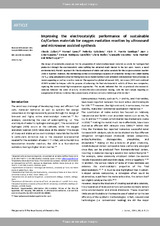Improving the electrocatalytic performance of sustainable Co/Carbon materials for oxygen evolution reaction by ultrasound and microwave assisted synthesis
Autor
Zuliani, Alessio
Cano, Manuel
Calsolaro, Federica
Puente-Santiago, A.R.
Giner-Casares, Juan J.
Rodríguez-Castellón, Enrique
Berlier, Gloria
Cravotto, Giancarlo
Martina, Katia
Luque, Rafael
Editor
Royal Society of ChemistryFecha
2020Materia
ElectrocatalysisOxygen evolution reaction
Electrocatalytic activity
Ultrasound-microwave techniques
METS:
Mostrar el registro METSPREMIS:
Mostrar el registro PREMISMetadatos
Mostrar el registro completo del ítemResumen
The design of sustainable procedures for the preparation of cobalt/carbon-based materials as an anode for hydrogen fuel production through electrocatalytic water splitting has attracted much interest in the last few years. Herein, a novel environmentally friendly approach for the development of stable and active catalysts for the oxygen evolution reaction (OER) is reported. In detail, the methodology aimed at developing a sequence of composites having a low cobalt loading (<4%wt) using polyphenols extracted from green tea as metal stabilizers and activated carbon derived from pinecones as a metal-support as well as a coactive material. The approach exploited ultrasound (US), microwave (MW) and combined US/MWassisted techniques with the purpose of enhancing the final electrocatalytic activity of these new composites, replacing conventional high-temperature approaches. The results indicated that the soproduced electrocatalytic materials followed the order of activity US > MW/US > MW > conventional heating, with the best sample requiring an overpotential of 365 mV to deliver a current density of 10 mA cm_2 and a Tafel slope of 58 mV dec_1.

